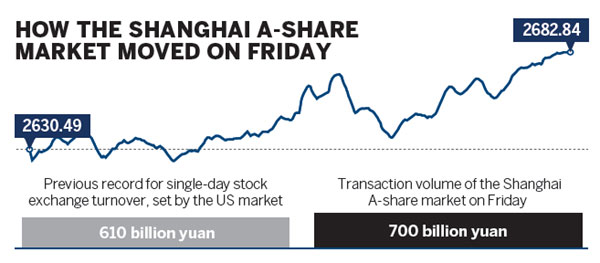 |
Rate cut seen widely as bullish factor; rally yet to attract offshore investors
The Shanghai A-share market made history on Friday by breaking the world record for turnover by any stock exchange in a single day.
More than 700 billion yuan ($114 billion) worth of shares changed hands on the bourse. The previous record was turnover of $99.5 billion, or 610 billion yuan at the current exchange rate, on July 26, 2007, on the US stock market.
The market capitalization of the A-share market surpassed that of Japan's to become the second-largest in the world on Thursday, following the US market.
Analysts said the rush to buy A-shares pushed prices up across the board. The Shanghai Composite Index continued its bull run of the past seven days, rising by another 2 percent to close at 2,682.84 on Friday.
The index has risen by 8.6 percent since the central bank surprised the market by announcing a cut in bank interest rates on Nov 21, the first in two years.
Many market analysts and investors have seen the cut as an indication that the central bank is shifting to a more expansionary monetary policy to combat the economic slowdown.
Although central bank officials have on various occasions said the rate reduction is a measure to help relieve the financial burden of many cash-strapped small to medium-sized enterprises in the private sector, investors have had different ideas.
Market analysts said the cut has been seen widely by investors as a bullish factor, as it could trigger a flood of new liquidity into the capital market. Demand for A-shares has been mounting since the start of this year, reflected in the index rising by more than 27 percent in this time and making the Chinese capital market one of the best performers globally.
But some analysts are not convinced that the rally can be sustained for much longer.
"Technically speaking, in regard to growth and turnover, the A-share market is already a bull market. But the recent rally has been driven mainly by domestic capital and it is uncertain whether the momentum can be sustained," said Hong Hao, chief strategist at Bank of Communications International.
He and others predict that the next resistance level will be at 2,750, with Hong saying this will be a crucial testing point.
To date, the rally has not significantly attracted offshore investors' money into the market. The daily Hong Kong-Shanghai Stock Connect quota has remained woefully underused. The quotas for the Qualified Foreign Institutional Investor scheme and Renminbi Qualified Foreign Institutional Investors scheme have remained unchanged in recent months.
QFII and RQFII are major channels that allow international investors to buy Chinese A-shares on a licensed basis.
Hong also said there has been no obvious surge in Exchange Traded Funds tracking A-shares in overseas markets, except for some individual products.
Chen Li, head of China equity strategy at UBS, said, "We believe market sentiment and liquidity will remain positive before Chinese New Year in February.
"Although the macroeconomy is slowing down, we see more liquidity as individual investors and enterprises pour money into the stock market," he said, adding that UBS has predicted that the Shanghai index will climb to 2,900 before major corrections.
Cross-border capital flows under the stock connect program have been lower than expected in the two weeks since its launch.
PROCEDURE CHANGES PATH TO IPO
The draft of a registration-based new share listing system has been finished and will be presented to the State Council soon, the securities regulator said on Friday.
The China Securities Regulatory Commission said in December it planned to dump its approval-based IPO system, which decides which firms get to list and when, and switch to a registration-based system under which the CSRC will only be responsible for examining applicants' qualifications, leaving investors and the markets to make their own judgments about a company's value and the risks of buying its shares.
The commission said earlier that the market should not see the registration-based system as a sign the government won't supervise and regulate the market anymore.
Zhang Xiaojun, a spokesman for the China Securities Regulatory Commission, said that the CSRC has led the establishment of a working group for the new share listing reform, and members include the National Development and Reform Commission, Ministry of Finance, People's Bank of China, Legal Affairs Office of the State Council, China Banking Regulatory Commission and China Insurance Regulatory Commission.
